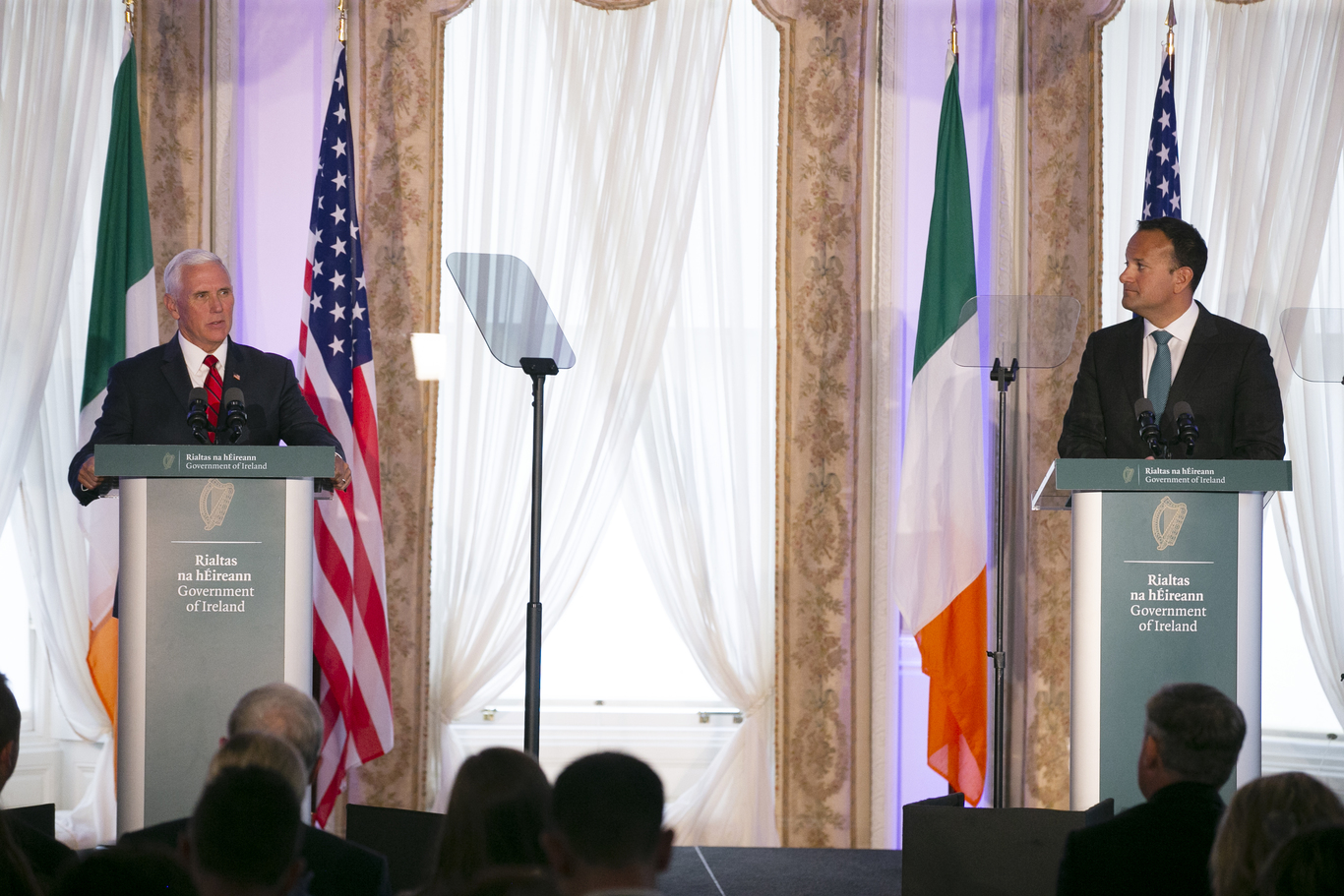Listen up, Ireland Inc - Mike Pence’s shot across the bow may be a warning of things to come
Irish leaders need to protect the long-term future of US investment in the Republic.
THOSE HOPING THAT US vice president Mike Pence’s recent trip to Ireland was going to be like an advert for Irish Americans wanting to connect with their ancestral roots to the old sod got a rude awakening.
Many US political leaders wear their Irish-American heritage with pride, and vice president Pence is, usually, no different.
But his comments about respecting the sovereignty of the UK and negotiating in good faith with British prime minister Boris Johnson over Brexit show he is clearly channelling US president Donald Trump’s voice and batting for the UK in this particular blood sport.
And might this be a signal of other, more ominous moves on the part of the US administration? And ones that might impact on Ireland’s enviable status as one of the best places to do business for US multinationals?
For a long time, Ireland was considered to be the model country for American companies overseas. Ireland’s attractions were manifold.
Not only did Ireland consistently rank highly in international surveys on the ease of doing business, and is home to a well-educated and English-speaking workforce, more importantly, Ireland’s corporate tax rate stood at 12.5%, far lower than any other country in the European Union except Hungary with 9%.
It was also just a fraction of the 35% rate which existed in the United States until president Trump recently took a page out of Ireland’s book and made cutting corporation taxes a core part of his economic agenda.
But there is a second equally important part in implementing lower corporate tax rates: reliability.
Jobs support
Previous Irish governments of various stripes held firm to this tax policy, and in doing so, made it clear that Ireland’s taxes were not just low, they were also predictable.
That predictability and certainty when it comes to tax are crucial for multinational companies and investors from all over the world.
Countries that have high levels of tax certainty are more comfortable to invest in, particularly when it comes to long-term projects, as you can trust the authorities to deal with you fairly and transparently. It is hard to underestimate just how important this factor is in understanding whether a nation succeeds or fails in attracting foreign direct investment.
Taoiseach Leo Varadkar himself told the US Chamber of Commerce earlier this year: “There are actually countries in the EU that have a lower tax rate than us … I think what we offer is certainty … and I think that gives investors or potential investors that certainty you need if you’re making the 20- or 30-year multibillion-euro investment in an economy.”
Given all this, it is no surprise that for many decades, American businesses came to know and appreciate that Ireland was a country which understood the enormous benefits of inward investment. The benefits of this to Ireland have been easy to see.
Currently, over 150,000 people in Ireland are directly employed in over 700 US firms operating here, while around 100,000 jobs in the Irish economy are supported by American companies.
Long-term future
Ireland’s policy of guaranteeing low tax rates has benefited all parties.
Now, however, the long-term future of US investment in Ireland is being threatened by an increasingly aggressive position when it comes to how companies’ earnings are treated by the Irish tax authorities and by growing uncertainty about how international tax changes could impact Ireland.
Recent tax rulings by Ireland’s Revenue Commissioners have resulted in high upward reassessments that could mean a dramatic shift to Ireland’s reputation for tax certainty and reliability. Companies which have acted in apparent good faith, which sought direction and advice in order to be tax compliant, now face massive bills for “underpayment” along with interest payments and other penalties.
Two examples of this shift are Analog Devices, which employs 1,200 people in Limerick. The company was served with a notice of assessment for €43 million, and Perrigo, which is facing a demand for a massive €1.6 billion.
Although both of these cases are under appeal, the fact that corporations are now being forced to take legal action to ward off enormous, unexpected tax bills might hurt future investment decisions.
Another game-changer in US-Irish economic relations was the 2017 Tax Cuts and Jobs Act by president Trump, in which corporate taxes went down from 35% to 21%.
Tax cuts in combination with massive deregulation efforts in the US, a higher unpredictability of the situation in Ireland and a change in the mood music from the US administration encourages many American businesses located in Ireland and elsewhere to return back home – and many of them say they intend to do just that.
Figures released this year by the US Commerce Department showed that American companies dramatically increased the amount of offshore profit they brought back to the US.
In 2017, companies brought home a total of $155.1 billion in offshore cash. In 2018, that figure more than quadrupled to $664.9 billion.
The roots of Ireland’s economic success
Although this is an extremely encouraging trend for the US economy, it might cast a dark shadow on Ireland’s economy if it continues.
There is no need for this to happen. Ireland has been a leader when it comes to tax competition and upholding a tax system which incentivises growth and investment on a long-term basis.
The Irish model has not only attracted many American companies, but it has also convinced many American and other European politicians to adopt a similar policy as well, which leads to more tax competition, economic growth and success.
Vice president Pence’s comments during his recent visit to Ireland must be cause for Irish politicians to sit up and worry about where the US’s allegiances will lie in any post-Brexit world.
Andreas Hellmann is the international program manager at Americans for Tax Reform.
Get our Daily Briefing with the morning’s most important headlines for innovative Irish businesses.






